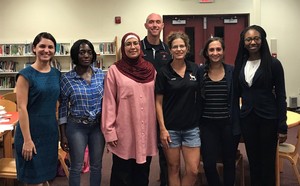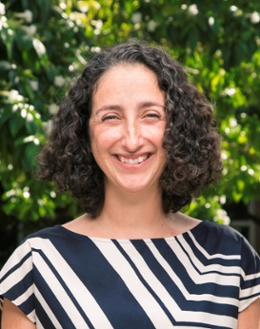College of Psychology team part of childhood obesity research grant
Partnering with Broward middle school on project
NSU College of Psychology faculty and students are part of a team studying methods for improving childhood obesity interventions.
The project is funded by a multi-year grant from the Washington, D.C.-based Patient-Centered Outcomes Research Institute, or PCORI.

“It was an opportunity to develop our community partnerships further and engage families in our partnerships, so we can work together on something that we hope would impact pediatric obesity in Broward County,” said Associate Professor Jessica Valenzuela, Ph.D., of the Department of Clinical and School Psychology.

The Fort Lauderdale-based nonprofit group Florida Introduces Physical Activity and Nutrition to Youth, or FLIPANY, partnered with NSU on the project. Valenzuela said PCORI grants are typically awarded in hospital or clinical settings, rather than the community. In this case, the grant is funding research conducted at Deerfield Beach Middle School.
“It made more sense to work in the community from a public health approach,” Valenzuela said.
The research team includes two Clinical Psychology doctoral students, Roya Amirniroumand and Kristina Tatum. The three-tier grant’s funding included $15,000 for the first year, where the team established relationships with parents, school administrators, and health care providers to gather information about the effectiveness of BMI (body mass index) screenings. Valenzuela noted that BMI screenings have been controversial, with some parents being offended over their children being classified as overweight or obese, but in South Florida there are also cultural nuances at work.
In the second year, with $25,000 from the PCORI grant, the team has focused on narrowing research questions and connecting to national stakeholders. The team is also applying for other grants to expand partnerships. They are also building up local capacity through the creation of an advisory board that includes parents, a school administrator, a school nurse, and a community representative, according to Kristine Perez-Carrion, FLIPANY’s Director of Programs.
“We also had a discussion group with children to get an idea about what their experience has been in even doing the BMI screenings,” Perez-Carrion said. “We looked at if children understood the message, and how that filtered back to the parents.”
The school’s current BMI screening procedure involves conducting the screening and sending a letter home with information about the child's weight category (underweight, average weight, overweight or obese). It asks that families follow up with their primary care provider and have the letter signed by that provider and returned to the school. Parents had questioned whether the BMI screening itself was the most effective measure, and if the letter was the best way to communicate the information. The team is also looking at underserved communities, as the majority of the school’s student body is ethnic minorities.
“Perception on weight is different in those groups,” said Tatum, a student in the Psy.D. program. “We want to understand parents’ perceptions and attitudes toward the BMI screening process and notification letter.”
Amirniroumand said the team is working with the advisory board to expand the partnership to other schools.
“It’s about a much larger concern of the prevalence of obesity not just nationally, but in Broward County,” said Amirniroumand, a student in the Ph.D. program. “That’s why it’s important to develop those relationships.”
For the third year, the grant will be a competitive process to develop a final research proposal. Valenzuela wants to build on the community partnerships and expand the focus to additional schools. She envisions being able to eventually work with all the county’s public schools to gather data and improve the BMI screening process.
“We need communities to inform our research questions and push us to require that the work we’re doing is meaningful for them and results in something for them,” Valenzuela said.